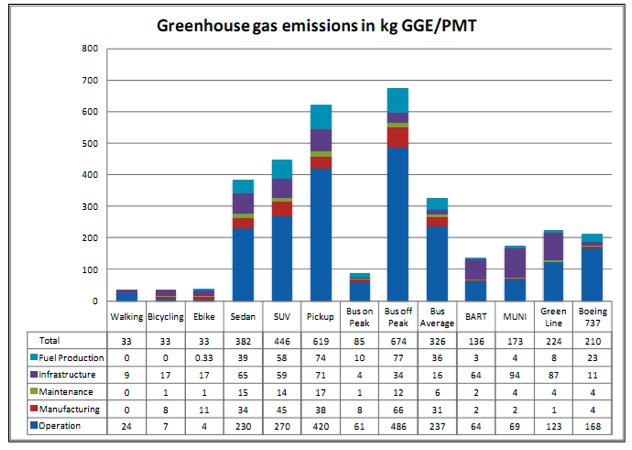
Slate's Brian Palmer wrote in an article this week that he's thinking of switching his commute "from four wheels to two" but he's concerned about the environmental impact of bicycling: specifically, "about all the energy it takes to manufacture and ship a new bicycle." He wants to know how many miles he would "bike the drive" before he's gone "carbon neutral."
He estimates the average carbon cost of the manufacture of a new bike at about 530 pounds of carbon dioxide equivalents, based on a research paper published last year by MIT scientist Shreya Dave [PDF]. But Palmer never asks about the carbon cost of his car. According to an analysis by The Guardian, manufacturing a new mid-size car produces more than 17 tons of CO2e -- about 75 times what it cost to make that bike. A top-of-the-line Land Rover would pollute twice as much, or 150 times the carbon footprint of the bicycle.
Palmer discounts the argument that bicycle "fuel" also harms the environment, since cyclists burn more calories and need to eat more. "As the Pacific Institute has shown, you'd have to be eating an all-beef diet to offset the environmental benefits of walking or bicycling," Palmer said. "Given a 'typical U.S. diet,' you would have to ride your bike instead of driving for around 400 miles to cover the bike's initial carbon footprint."
The food argument also assumes that if you didn't bicycle, you wouldn't do any exercise at all that would require more caloric intake. Do people who don't exercise really eat less? And either way, is an exercise-free planet really a healthier planet?
Adding up carbon output from fuel, infrastructure, maintenance, manufacture, and operation, Shreya Dave's research doesn't even bother with the food-as-fuel argument and puts the bicycle's fuel carbon footprint at zero per passenger mile, though it does consider a relatively high operational carbon footprint since "a conventional bicycle requires the operator to work harder and breathe more heavily." The data also claims, shockingly, that the carbon output of the manufacture of a bicycle, per passenger mile, is twice that of a Boeing 737, and that the infrastructure required to run the bicycle is 50 percent greater.
Still, Dave says that building, paving, and maintaining roads for cars emits almost four times the greenhouse gases as doing the same for bike lanes -- in those special places where dedicated bicycle facilities even exist. And of course, Palmer writes in Slate, "your bike isn't exactly tearing up the asphalt." Weighing in at less than one percent of the weight of a Prius, a bicycle just isn't responsible for the kind of road maintenance that cars are.





